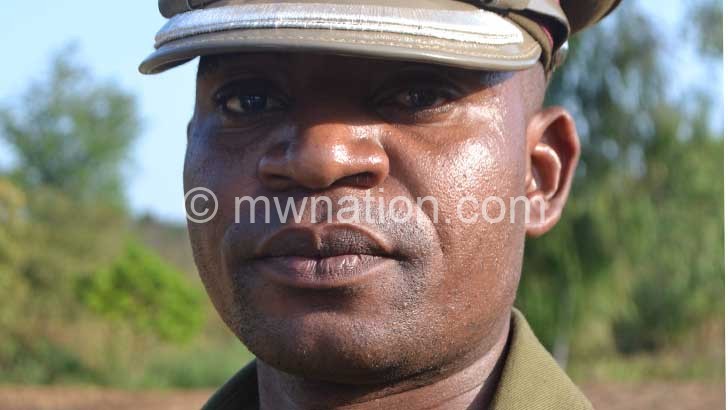Prison Covid-19 crisis worsens
The number of Coronavirus cases in the country’s prisons has increased to 107 with Chichiri Prison in Blantyre and Nkhata Bay Prison as the worst hit.
Prisons spokesperson Chimwemwe Shaba said in an interview 71 of the total cases are from Chichiri Prison where 68 inmates and three Prisons staff tested positive for Covid-19. He said Nkhata Bay Prison has 29 cases comprising 12 inmates and 17 staff.
He said one officer at Mzimba Prison has recovered while Maula Prison in Lilongwe recorded six new cases imported from Salima.
Said Shaba: “All these figures, like for Chichiri, are emanating from the first tests that were conducted. We have now engaged the Blantyre District Health Office which has sourced 500 test kits, and will start mass tests at Chichiri from August 10.
“In other prisons, testing priority will go to those showing symptoms of Covid-19, it’s not that we have abandoned mass testing, as you may know it depends on availability of test kits which are a problem across the country.”
He said remandees are screened first at four centres across the country before mixing them with others.

Said Shaba: “We have four isolation centres, namely Thyolo for the South, Zomba for Eastern Region, Maula for the Centre and Mzimba for the North. So, before someone on remand is mixed with the rest, they are first sent to these centres for screening and are integrated after 14 days.
“So, out of all these cases we have, only one has recovered, meaning, we still have 106 actives cases amidst us. We hope that more test kits will be made available for mass testing.”
The number of cases in prisons represents 2.45 percent of the total national cases standing at 4 361. But despite the rising cases, the country’s prisons remain congested with between 14 000 and 14 200 inmates on a daily basis.
According to the Centre for Human Rights Education, Advice and Assistance (Chreaa), Malawi’s prisons currently hold 14 000 people against the design capacity of 5 000 inmates.
If one tests positive, they are put in designated cells, according to Shaba who said that at Chichiri the 380-capacity structure the Anadkat family built is being used as the designated cell.
In an interview, Chreaa executive director Victor Mhango said Malawi is one of 22 countries in the world whose prisons exceed 200 percent capacity, meaning measures such as social distancing are impossible, exposing the inmates to a high risk of contracting Covid-19.
In a letter to President Lazarus Chakwera on July 16, Mhango, representing other stakeholders, said the overcrowding and the nature of prison conditions in general, has meant that diseases such as TB, malaria and HIV are already rife in Malawi’s prisons.
Epidemiologist Titus Divala said the situation in prisons is dire, saying, to minimise deaths, there is need to conduct risk stratification by identifying inmates who have the highest risk of dying.
He said: “These need to be urgently tested and isolated from the rest of the inmates. Their sentences can be reviewed for possible pardon. They should, however, not be put in one block to avoid devastating outbreaks. Erect five inmates-rooms in all prisons. These can be used to accommodate this population of inmates.
“The prison itself needs to prepare for infection through detailed sensitisation of inmates on the disease and its prevention, including physical distancing, masks, cough and hand hygiene. Putting in place protocols for identifying and referring sick inmates to treatment centres. Ensure adequate protective wear for staff and inmates.”
Society of Medical Doctors president Victor Mithi said prisons are especially vulnerable to Covid-19 because people live in a closed environment.
“Prisoners have limited access of masks and other protective equipment. So, the best approach is to ensure that the prisons are decongested by releasing those with minor offences and on those remaining we have to conduct massive testing,” he said.
Meanwhile, the Ministry of Health, through spokesperson Joshua Malango, has said the ministry is working with the Prison authorities in a number of ways, including identifying vulnerable people and enhancing prevention measures.
He said: “Ministry is working with the Prison authorities firstly in a number of ways, including identifying vulnerable people and enhancing prevention measures, testing and provision of PPEs to prison health workers through the office of director of health and social services in the districts.
“Take note that the Presidential Committee on Covid-19 has guided that more resources are put to the Prison to support the Covid response.”
In his daily update on the pandemic on Tuesday, co-chairperson the Presidential Task Force on Covid-19 Dr John Phuka said everyone must be treated as a potential carrier of the virus.
He said: “Get screened for chronic conditions; this means getting checked if you have diseases such as diabetes [sugar disease], hypertension [high BP], TB and HIV.
“Ensure the chronic condition you live with is under control; this means ensuring you are regularly taking medication for diabetes, hypertension (high BP), HIV, TB and asthma.”
Cumulatively, by Tuesday, Malawi had recorded 4 361 cases, including 128 deaths. Of these cases, 1 017 are imported infections and 3 344 are locally transmitted. The country has so far conducted 32 144 Covid-19 tests in 45 Covid-19 testing sites.





